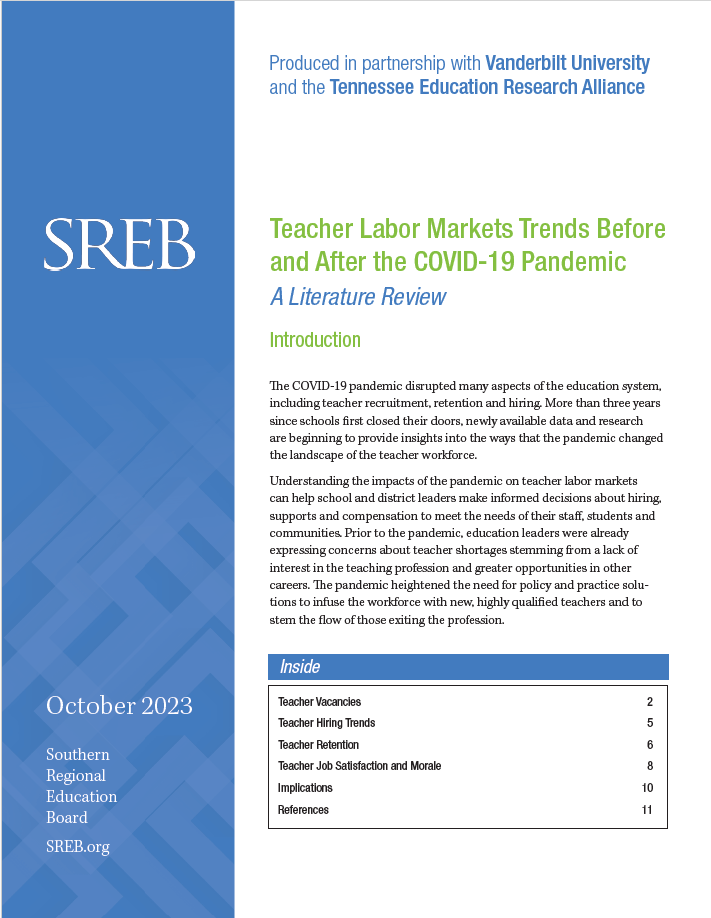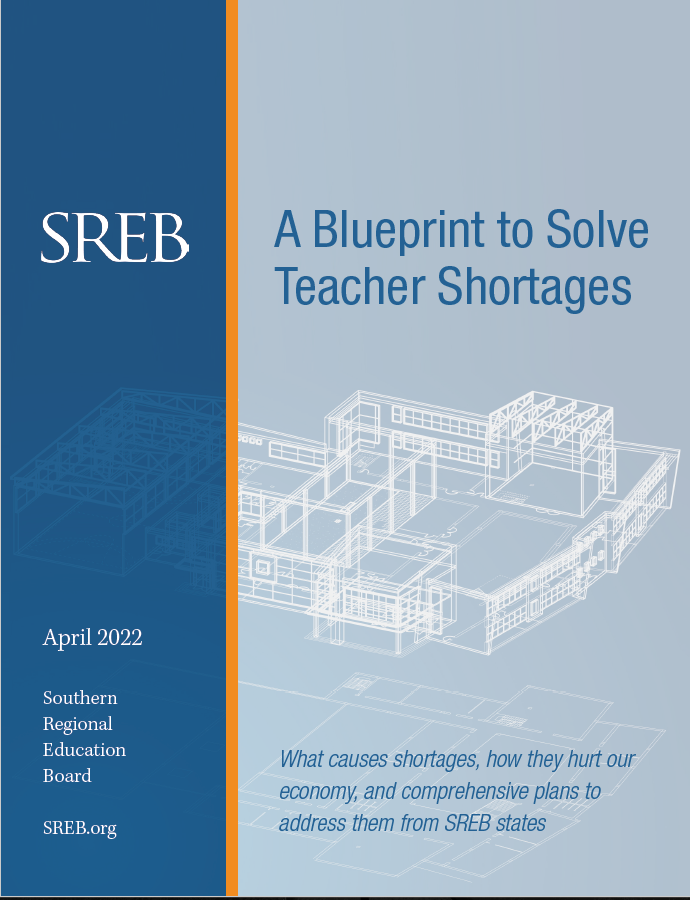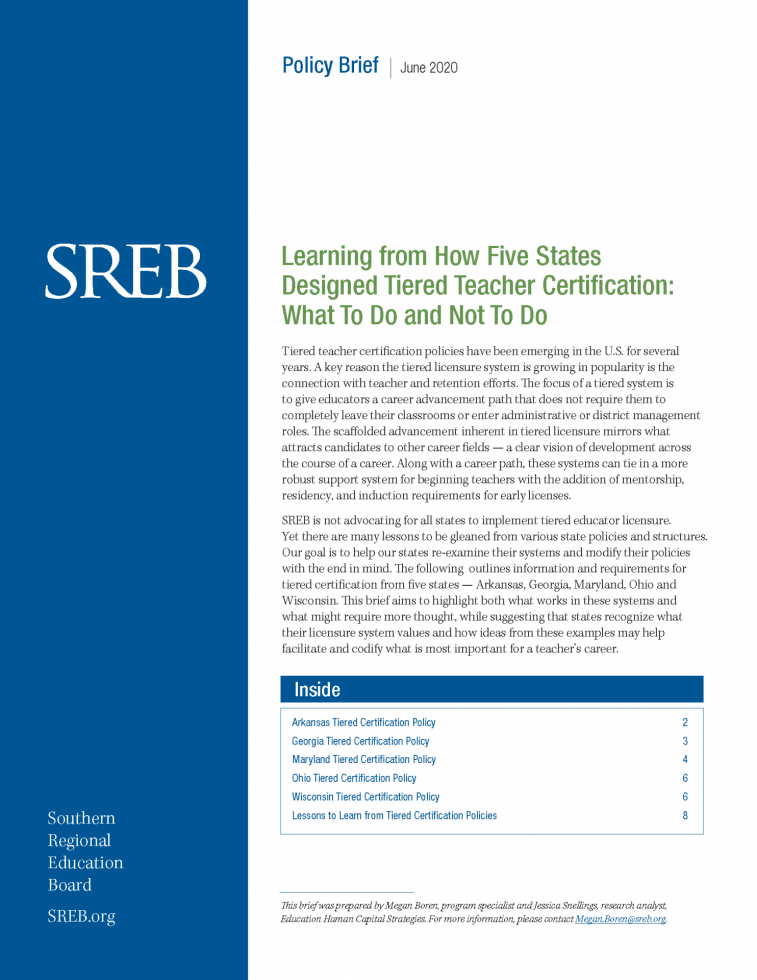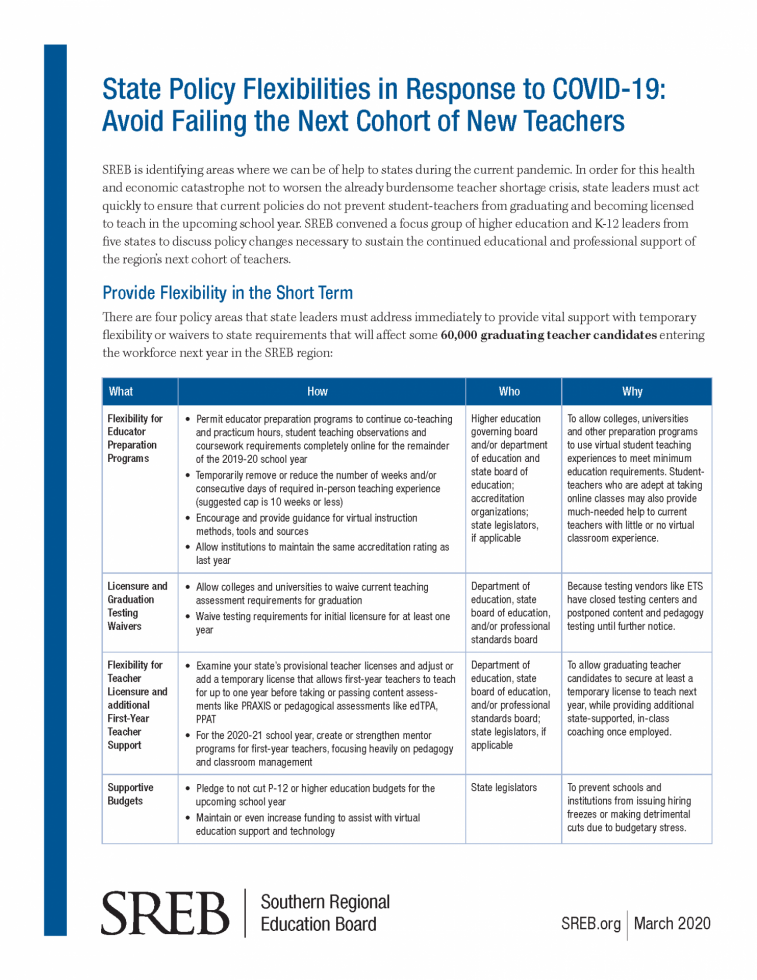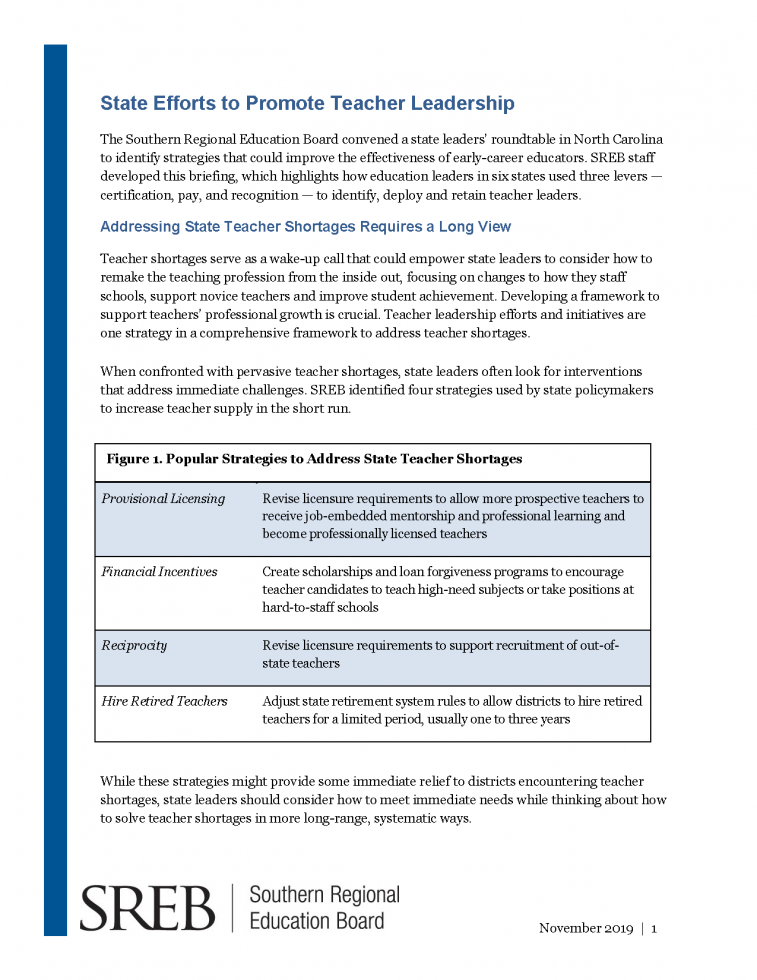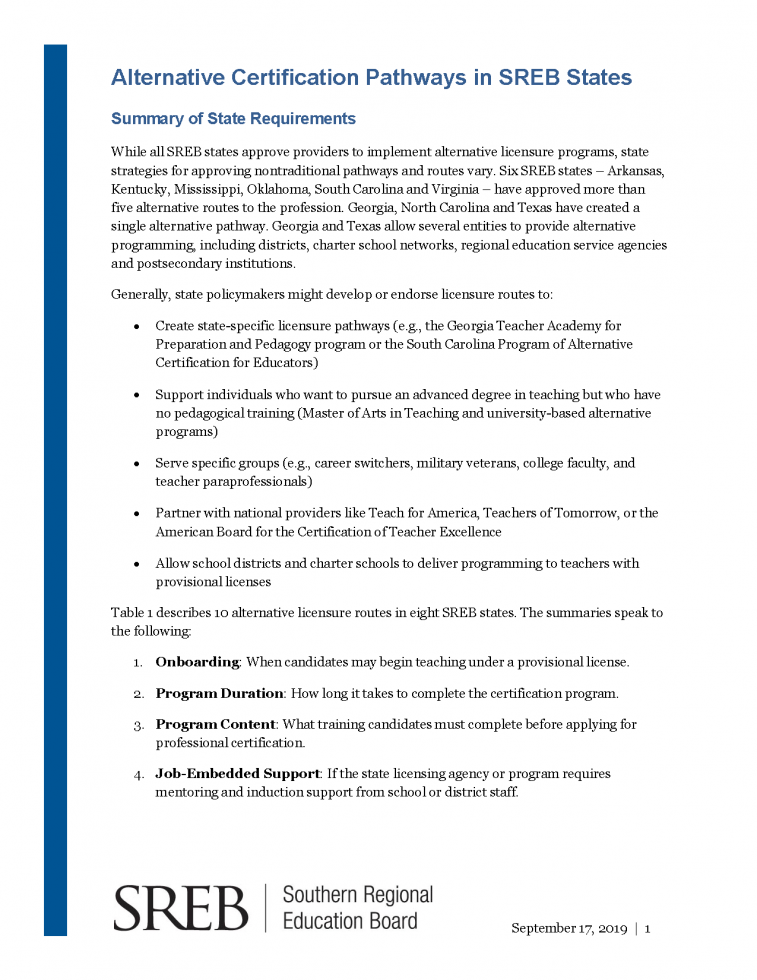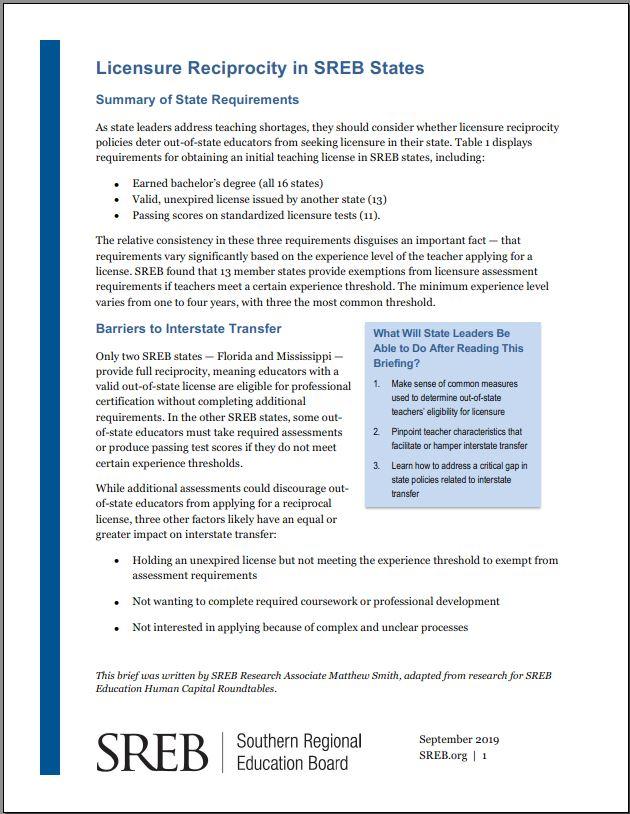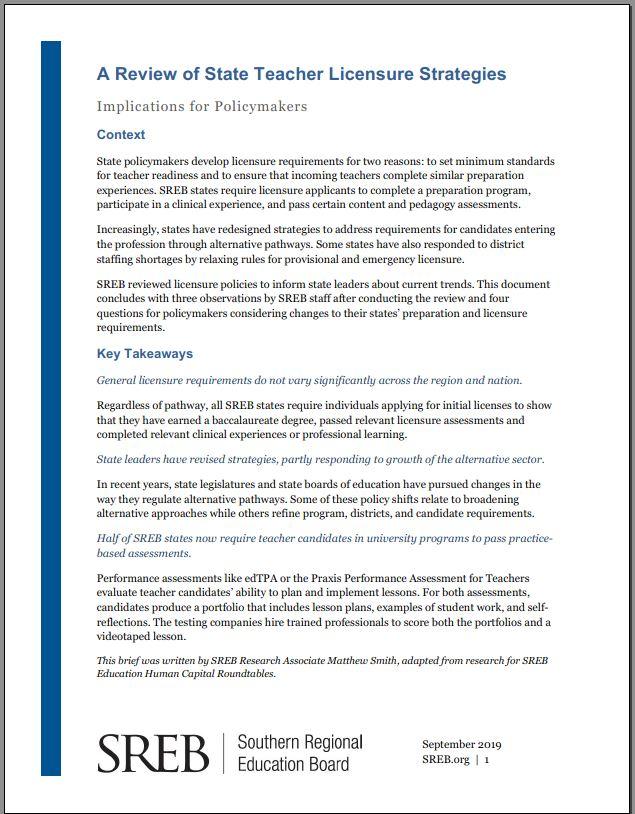Topic: Teacher Licensure and Certification
Teacher Licensure and Certification
Teacher licensure and certification are core pieces of a comprehensive strategy for developing the educator workforce. Strong licensure and certification systems should scaffold up based on teachers’ demonstrated skills, competencies, and impact — and align with the pay and ongoing support they receive.
Learn more about what strong teacher licensure systems look like
- Base licensure structures on more than academic degrees, tests, and years of experience. Consider ways to more accurately identify teachers’ skills, growth and impact with students — for example, incorporating classroom observations and a variety of assessments.
- Create a tiered licensure system that teachers can advance through as they grow their skills and positive impact with students. Set multiple entry points for each level.
- For strong teachers, connect higher tiers of the licensure system to various options for advanced roles that allow them to grow their skills, support their colleagues and earn more money.
- Consider how the licensure system is part of a connected, congruent policy structure that attracts, prepares, retains and grows strong teachers.
How SREB supports states with teacher licensure and certification
SREB’s Teacher Preparation Commission met to develop practical and effective recommendations. One key recommendation advises states to require a common set of criteria for initial licensure, regardless of a teacher’s preparation route. Read more about the Commission’s recommendations by visiting our Teacher Preparation Commission page.
SREB’s Education Human Capital Roundtables offer proposals for states on complex decisions — such as reciprocity among states, alternative pathways to certification, and the coursework, clinical experience and exams required for attaining certification. Learn more about this work and how to reach out for assistance by visiting our Education Human Capital Roundtables page.
From Preparation to Practice:
Early-Career Teacher Experiences in Three Southern States
The Southern Regional Education Board and partner researchers at Vanderbilt University conducted interviews with 30 new teachers in three states in fall 2024 as part of our third study together on the teacher workforce. This post features five novice teacher profiles to highlight the complexity of beginning teachers’ journeys from preparation to teacher-of-record. These profiles reinforce the study’s key findings on the need for new teachers to feel supported in their roles through a comprehensive system of support from preparation to placement to their first years in the classroom.
Pathways and Retention for New Teachers
Insights from Southern States
 Early-career teachers are entering the profession via an expanding variety of pathways. Do certain pathways provide more support than others? Do some entry routes into teaching yield higher rates of teacher retention? Why has early career teacher retention dipped so low and what can we do to change that?
Early-career teachers are entering the profession via an expanding variety of pathways. Do certain pathways provide more support than others? Do some entry routes into teaching yield higher rates of teacher retention? Why has early career teacher retention dipped so low and what can we do to change that?
A research partnership between SREB and Vanderbilt University explores these questions and more by analyzing state administrative data, survey results, and teacher interviews across three states in the South.
A Blueprint to Solve Teacher Shortages
For School and District Leaders
The solution to teacher recruitment, quality and retention requires a comprehensive, long-term approach and reliable data. This report offers a framework for district planning and action, covering policy and practice for pathways and preparation, licensure and advancement, professional support and mentorship, and compensation and working conditions.
Teacher Labor Markets Trends Before and After the COVID-19 Pandemic
A Literature Review
The COVID-19 pandemic disrupted many aspects of the education system, including teacher recruitment, retention and hiring. More than three years since schools first closed their doors, newly available data and research are beginning to provide insights into the ways that the pandemic changed the landscape of the teacher workforce.
A Blueprint to Solve Teacher Shortages
For State Leaders
Imagine a world where more great people enter teaching, stay in the profession, and get better and better. How do we achieve this?
This report offers insight for state leaders on how to elevate the profession by renovating policies that affect the teacher workforce. With lessons from SREB states that have forged comprehensive plans, it covers pathways and preparation, licensing, mentoring and support, and compensation structures. The report also includes data on shortages, what causes them and how they hurt our economy.
Learning from How Five States Designed Tiered Teacher Certifications
What To Do and Not To Do
A look at tiered teacher certification policies from five states highlights what works and what might require more thought.
Teacher Licensure Requirements
Minimum Requirements for Initial Teacher Licensure by State
Updated July 2019
The SREB Teacher Preparation Commission recommends that state licensing require practice-based assessments. Eight SREB states have adopted practice-based assessments since 2010.
The updated table summarizes state licensure assessment and clinical practice requirements for all licensure candidates, including those enrolled in alternative pathways.
A Long-Term Solution to Teacher Shortages
Finding the Root of the Problem
We’ve all heard the saying “You can’t see the forest for the trees.” When it comes to state policies affecting the teacher workforce, it’s important to see both.
Teachers make life-long impressions on thousands of students — over 3,000 in an average career — and help raise every generation to understand the world and become productive, well-rounded citizens.
State Policy Flexibilities in Response to COVID-19
Avoid Failing the Next Cohort of New Teachers
With colleges and schools moving online to curb the spread of COVID-19, state leaders will need to act quickly to ensure that policies do not prevent student-teachers from graduating and becoming licensed to teach in the fall. This brief includes immediate and longer-term recommendations to prevent pandemic closures from escalating the teacher shortage crisis.
Rethinking State Teacher Licensure Requirements
This webinar explored how measures other than licensure exams — observations, surveys, interviews or portfolios, for example — can round out how states assess the readiness of teacher candidates. Also: how North Carolina is forging ahead to transform its licensure requirements.
State Efforts to Promote Teacher Leadership
In the face of teacher shortages, state leaders have an opportunity to explore ways of remaking the teaching profession from the inside out, rather than relying solely on short-term solutions. One strategy: teacher leadership and mentorship initiatives. This brief highlights how education leaders in six states used three levers ─ certification, pay and recognition ─ to identify and retain teacher leaders.
Alternative Certification Pathways in SREB States
Summary of State Requirements
All SREB states provide alternative routes to teacher certification, however the strategies for approving nontraditional pathways vary from state to state. This brief provides 10 examples of alternative certification programs in eight SREB states and includes recommendations policymakers should consider when designing or approving alternative certification programs.
Teacher Licensure Governance by State
February 2020
In 15 of 16 SREB states, the state education agency governs teacher certification. In Georgia, a professional standards commission governs licensure.
Licensure Reciprocity in SREB States
Summary of State Requirements
This brief describes state policies for granting teaching licenses to educators from other states. Some policies are common across many states, but requirements vary significantly from state to state based on the experience level of the teacher. Clarifying requirements for recent graduates of out-of-state teacher preparation programs could improve interstate transfer.
A Review of State Teacher Licensure Strategies
Summary of State Requirements
SREB reviewed state teacher licensure policies to inform leaders about trends including how states regulate alternative pathways and the move toward practice-based assessments. The brief also includes questions for policymakers who are considering changes to their states’ teacher preparation and licensure requirements.
State Teacher Licensure Information
Licenses Types and Approved Alternative Pathways by State
Updated July 2019
The SREB Teacher Preparation Commission recommends that states hold all new teachers to the same high standards , regardless of the pathway type.
The updated table summarizes the types of licenses issued by SREB states and alternative pathways into the teaching profession.
Making Sense of Changes to Teacher Preparation and Licensure
SREB state legislators introduced over 4,600 education bills in 2019 regular sessions. At least 850 of these bills will become law, with roughly one hundred this year relating to teachers and principals. Here’s how seven notable bills align with SREB’s Teacher Preparation Commission recommendations.
Getting the Balance Right
Reconsidering the Mix of Teacher Licensure Measures
The SREB Teacher Preparation Commission called on state leaders to adopt practice-based assessments. These tests assess candidates’ readiness to lead a classroom and to apply lessons learned during coursework and clinical experiences.
Practice-based assessments have diagnostic value, meaning they provide performance data that educator preparation programs can use to identify strengths and opportunities for improvement. State agencies could use the assessment data to determine how they will provide technical assistance to preparation programs.




